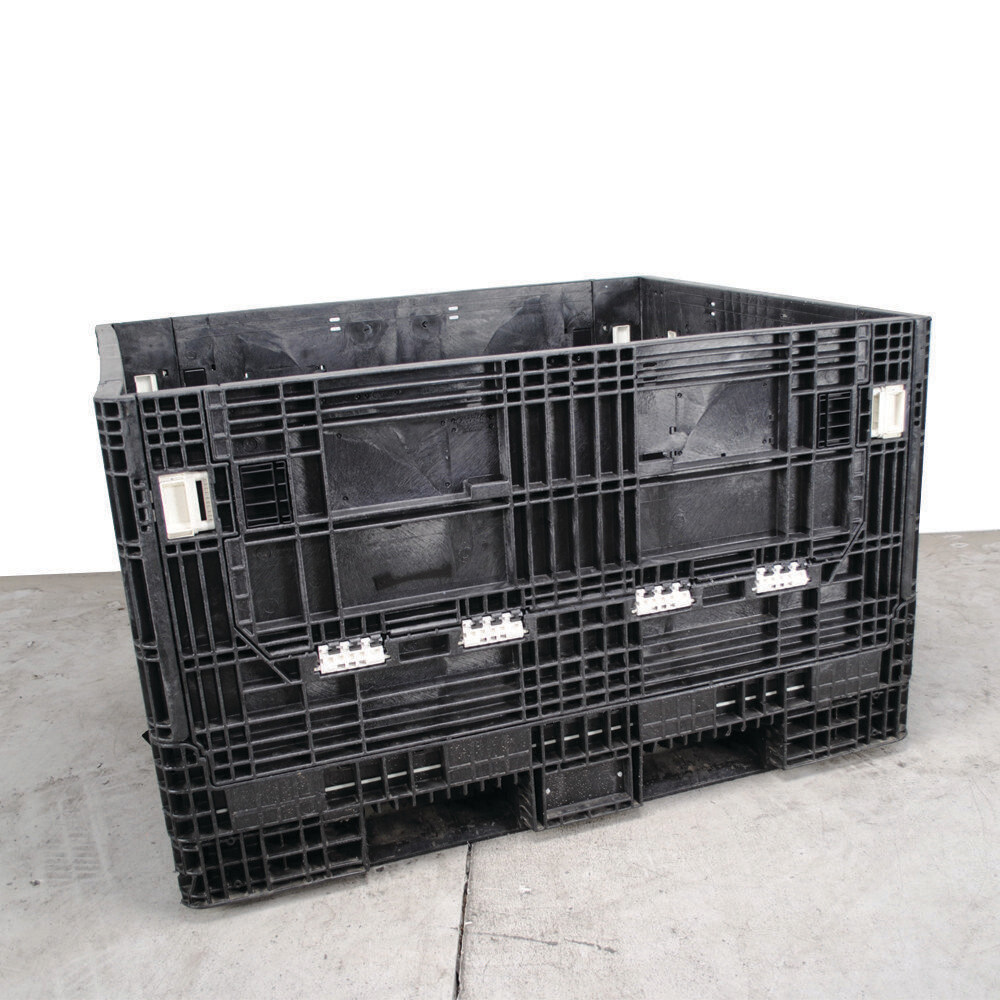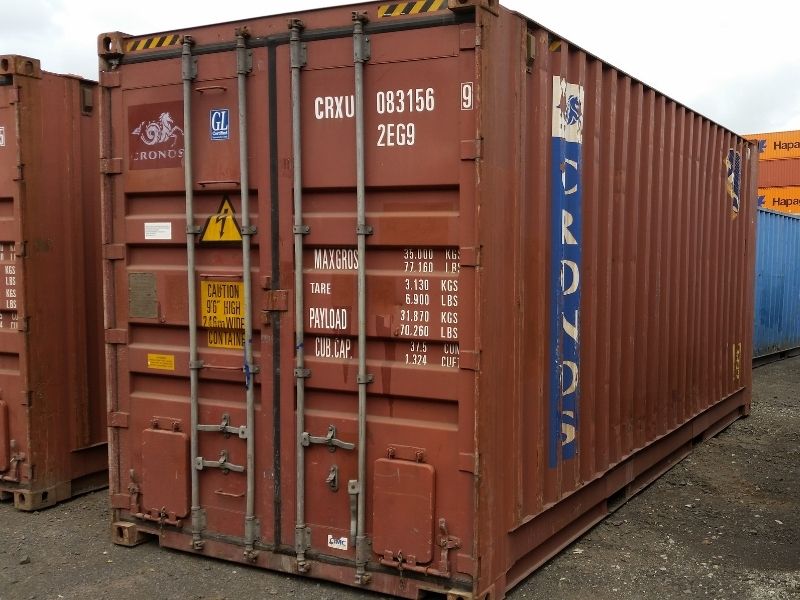Why Mass Containers Are Important for Lasting and Cost-efficient Transportation
Mass containers play a vital function in modern-day logistics. They help with the effective activity of large quantities of goods, thus enhancing transportation processes. This approach not just reduces costs but also minimizes ecological influence via reduced discharges and waste generation. As markets look for even more sustainable practices, the adoption of mass containers is becoming increasingly significant. What effects does this change hold for future logistics and supply chain administration?

The Benefits of Using Mass Containers in Logistics
Bulk containers change logistics by improving effectiveness and sustainability. These containers enable the transport of large quantities of goods in a single trip, substantially decreasing the variety of journeys called for. This not just simplifies procedures but additionally lessens labor prices linked with handling, loading, and unloading. In addition, bulk containers are designed to optimize area use within transportation lorries, making certain that even more items can be shipped simultaneously.
The standardization of mass containers also simplifies the logistics process. With consistent dimensions, they can be easily piled and stored, leading to boosted warehouse monitoring. In addition, mass containers commonly include resilient materials that protect contents from damage during transportation, consequently reducing product loss and raising total integrity. Therefore, businesses can experience boosted supply chain performance, ultimately causing boosted success and consumer contentment. This mix of elements makes bulk containers a crucial property in contemporary logistics.
Ecological Influence: Reducing Waste and Carbon Impact
As sectors significantly prioritize sustainability, the adoption of mass containers has become a crucial strategy for minimizing waste and reducing carbon impacts. These containers minimize the use of packaging materials, such as boxes and plastic, thereby significantly decreasing general waste generation. By settling shipments, mass containers boost transportation effectiveness, enabling even more items to be delivered per trip. This decrease in journeys directly associates with lower greenhouse gas exhausts, contributing to a smaller sized carbon footprint.
Mass containers can frequently be reused or reused, better mitigating environmental effect. The durability of these containers assurances they can stand up to numerous transportation cycles, reducing the requirement for single-use choices. refurbished bulk containers. By simplifying logistics and advertising effective resource use, bulk containers not just sustain lasting practices but also motivate sectors to straighten with international ecological goals. Eventually, their execution mirrors a dedication to eco-friendly stewardship and liable source administration
Expense Cost Savings: How Mass Containers Lower Transport Expenses
While many companies look for methods to enhance their lower line, the use of bulk containers offers a significant possibility for decreasing transportation costs. Bulk containers make best use of the quantity of goods transferred, enabling organizations to deliver larger amounts simultaneously. This performance lowers the number of journeys needed, directly lowering fuel costs and minimizing labor expenditures connected with loading and unloading.
In addition, bulk containers often include streamlined styles that optimize room usage within transport vehicles. This indicates fewer vacant areas, leading to a lot more effective use readily available capability. The sturdiness of mass containers can decrease the threat of product damage throughout transit, decreasing losses and guaranteeing that more products arrive undamaged.
Enhancing Supply Chain Effectiveness With Bulk Storage Solutions
Mass storage remedies play a crucial duty in boosting supply chain performance by enhancing inventory monitoring. By consolidating items right into fewer, larger containers, services can greatly lower taking care of costs connected with frequent transfers and handling. This streamlined method permits better monitoring and monitoring of supply, eventually bring about enhanced operational efficiency.
Structured Inventory Monitoring
Efficient supply management is important for enhancing supply chain procedures, specifically when organizations adopt bulk storage solutions. These remedies allow services to preserve higher supply levels while lessening the regularity of replenishment. By settling materials into mass containers, business can streamline their inventory processes, reducing the intricacy connected with tracking multiple smaller bundles. This technique promotes accurate inventory counts and enhances forecasting accuracy, enabling more informed decision-making. Additionally, mass storage options streamline storehouse company, making it much easier to find and access products when required. As an outcome, organizations can achieve an extra effective supply turn over price, inevitably enhancing total supply chain efficiency and minimizing the probability of stockouts or overstock scenarios.

Minimized Handling Costs
The implementation of mass storage space remedies not just improves supply management however additionally considerably decreases taking care of costs across the supply chain. By settling materials into bulk containers, companies lessen the demand for constant handling and transfer between different storage and transport units. This strategy lowers labor expenses connected with loading, discharging, and moving smaller plans. Furthermore, mass storage reduces the frequency of deliveries, bring about reduced transport prices and decreased gas intake. As a result, businesses can optimize their logistics operations, enabling a much more effective allotment of resources. Eventually, lowered handling prices add to enhanced overall supply chain efficiency, fostering an environment that supports both sustainability and financial viability.

Flexibility of Mass Containers Across Different Industries
Several industries have distinct needs for transport and storage, bulk containers have arised as a functional solution that meets a large array of demands. These containers, varying from huge bins to specialized tanks, can accommodate diverse materials, including powders, liquids, and granules. In the farming market, mass containers promote the transportation of grains and plant foods, while the food and drink sector uses them for components and completed items. The chemical market depends on bulk containers for safely delivering unsafe products, making certain conformity with safety and security laws. In addition, building and construction companies benefit from mass containers for transporting aggregates and other materials. Their flexibility includes different settings of transportation, including ships, trains, and vehicles, boosting logistical performance. This adaptability not only enhances operations across various markets but additionally advertises sustainability by reducing product packaging waste and enhancing space in transportation. Bulk containers play an important duty in modern supply chain administration.
Future Trends in Bulk Container Use and Sustainability
The future of bulk container use is progressively shaped by cutting-edge materials development that boosts sustainability. Furthermore, automation in logistics promises to enhance operations, lowering waste and enhancing performance. Welcoming round economic climate methods will better reinvent how bulk containers are created, made use of, and recycled, promoting an extra sustainable transportation landscape.
Cutting-edge Materials Growth
As industries significantly prioritize sustainability, ingenious products advancement wholesale containers becomes a substantial element in enhancing eco-friendly transport options. Manufacturers and scientists are checking out eco-friendly plastics, recycled compounds, and lightweight steels to reduce environmental impact. These products not only reduce waste yet also boost gas effectiveness by decreasing the total weight of containers. Furthermore, developments in wise materials, which can adapt to differing conditions, enhance the durability and capability of bulk containers. The combination of these cutting-edge products aligns with round economy principles, advertising reuse and recycling. As the need for lasting methods grows, the advancement of such materials will play a vital role in shaping the future of mass container use in logistics and transport.
Automation in Logistics
Considerable developments in automation are poised to change logistics and the application of mass containers, improving sustainability in transportation. Automated systems, consisting of drones and independent automobiles, are enhancing the motion of bulk containers, minimizing the dependence on conventional fuel-powered transport. These modern technologies maximize directing and loading procedures, boosting and lessening empty miles gas effectiveness. Furthermore, automated inventory monitoring systems improve tracking and surveillance of bulk containers, ensuring far better resource allocation and lowered waste. The combination of the Internet of Points (IoT) enables real-time information analysis, making it possible for positive decision-making that aligns with sustainability objectives. As automation proceeds to evolve, it is anticipated to drive additionally advancements wholesale container use, inevitably sustaining more sustainable logistics techniques and reducing the ecological influence of transportation.
Circular Economic Climate Practices
Innovations in automation are establishing the phase for a much more integrated technique to round economy methods in the domain of bulk container use. As industries progressively accept sustainability, bulk containers are being developed for longevity and reusability. This change not only lessens waste but additionally improves source effectiveness. Firms are embracing approaches such as closed-loop systems, where utilized containers are accumulated, refurbished, and reestablished right into the supply chain. Furthermore, clever modern technologies track container life process, helping with better management and lowering ecological impact. The partnership between makers, logistics carriers, and end-users is necessary in developing standards for sustainable container usage. refurbished bulk containers. Future patterns suggest a growing emphasis on products that are recyclable and biodegradable, further reinforcing the circular economy's principles in mass transport

Often Asked Inquiries
What Materials Are Bulk Containers Commonly Made From?
Bulk containers are generally built from resilient products such as high-density polyethylene, cardboard, aluminum, and steel. These products provide flexibility, security, and stamina, making them appropriate for delivering numerous items in various sectors effectively.
Exactly how Do I Select the Right Dimension Bulk Container?
Picking the best dimension bulk container includes examining the quantity of products to be transferred, taking into consideration taking care of tools compatibility, and appraising storage area needs. Proper dimension warranties efficiency in transportation and reduces waste throughout delivery.
Are Mass Containers Reusable or Recyclable?
Mass containers are frequently recyclable, created for several trips, boosting sustainability. Several can likewise be recycled, relying on the products utilized. Choosing recyclable alternatives even more supports ecological goals and decreases waste in transport practices.
What Safety And Security Laws Apply to Mass Container Transportation?
Safety laws for mass container transportation consist of compliance with the Division of Transportation standards, appropriate labeling of hazardous products, architectural stability assessments, and adherence to weight limitations to ensure secure handling and prevent crashes throughout transit.
Exactly How Can Organizations Shift to Using Bulk Containers Successfully?
Organizations can alter to bulk containers by examining existing logistics, training team on handling, investing in appropriate equipment, maximizing supply monitoring, and collaborating with vendors to assure compatibility and performance throughout the supply chain.
As industries significantly focus on sustainability, the get more info fostering of bulk containers has actually arised as a crucial technique for decreasing waste and decreasing carbon impacts. By combining materials into mass containers, firms can streamline their stock processes, lowering the complexity associated with tracking several smaller sized plans. As sectors increasingly prioritize sustainability, cutting-edge materials advancement in bulk containers emerges as a substantial element in boosting green transportation solutions. Automated systems, including drones and autonomous cars, are enhancing the motion of bulk containers, minimizing the dependence on standard fuel-powered transport. In addition, automated supply management systems enhance tracking and monitoring of mass containers, guaranteeing far better source allotment and lowered waste.